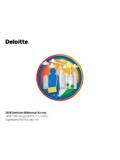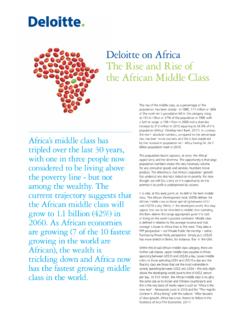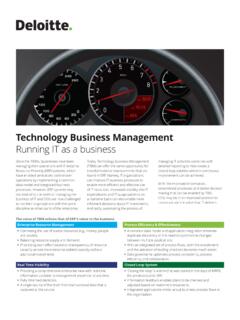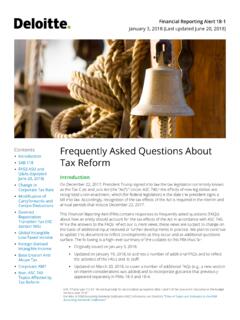Transcription of UK REITs A summary of the regime - Deloitte
1 UK REITs A summary of the regimeFebruary 2022 Page 1 The UK Real Estate Investment Trust ( REIT ) regime launched on 1 January 2007 and immediately saw a number of the UK s largest listed property companies convert to REITs . Since then, the regime has continued to evolve, with a number of developments in recent years increasing the attractiveness and accessibility of the regime to a wider pool of property investors and providers of capital. Further changes to the regime are due to take effect from 1 April to the global REIT brand REITs are known and understood by both investors and analysts worldwide as tax efficient structures for investment in real estate. There are currently countries worldwide that have REIT or REIT-like regimes in of international capital REITs have a proven track record of attracting international capital. There are significant investment pools and fund allocations specifically designated for investment in REITs . Conversion to REIT status can often unlock new sources of elimination of latent capital gains REIT status may reduce or potentially eliminate any discount to net asset value caused by latent capital gains.
2 REITs often have a competitive advantage on corporate acquisitions, as other non-REIT bidders may have to discount their purchase price for latent capital are therefore able to make commercial decisions in a tax-exempt environment, based on the commercial performance of individual attractive vehicle for raising capital from a wide range of sources REITs may be attractive to investors for the following reasons: Attractive for UK and overseas retail and institutional investors. Easier access to property investment compared to purchasing a property directly. Indirect investment into property through a readily tradeable investment asset. Access to parts of the property sector that private investors cannot usually access, shopping centres or industrial property. Regular income returns. Lower transaction costs, stamp duty on shares compared to 5% stamp duty land tax on direct property. The table above is based on a UK corporation tax rate of 25% (applicable from 1 April 2023), and assumes a notional distribution by a REIT vs.
3 UK fully taxable company of 100, which represents net rental income, ignoring capital gains and assuming no dividend tax allowance. Some small individual investors who are holding their shares outside an ISA/SIPP (and have unused annual dividend tax allowance), may enjoy higher after tax returns under the UK corporate structure rather than a REIT. This is because property income distributions ( PIDs ) from a REIT are not eligible for the annual dividend tax allowance (which is 2k in 2021/22).InvestorAfter tax return from UK company After tax return from UK REITE nhancement of returnUK pension funds/ISAs, SIPPs and sovereign wealth investor (beneficial tax treaty)758513. 3%UK individual basic rate (20%) tax payer individual higher rate (40%) tax payer individual additional rate (45%) tax payer company7575 NilComparison of after tax returns in a UK taxable company and a UK REITThe UK REIT regime Page 2 Key benefits of REIT statusREIT status affords a number of commercial and tax benefits, including:Requirements to achieve and maintain REIT statusThere are a number of conditions that a company (or principal company of a group REIT) needs to satisfy in order to become a REIT and remain within the regime .
4 If these conditions are breached, the penalty can range from automatic expulsion from the regime to additional tax liabilities for the REIT. Some of the key conditions are summarised below. (Certain changes to the regime are due to take effect from 1 April 2022. These are discussed on the next page.) Admitted to trading on a recognised stock exchange : The REIT must be admitted to trading on a recognised stock exchange and either: listed on such an exchange; or traded on such an exchange in every accounting period, except the first three. Not a close company: The principal company must either: Not be a close company, which means, broadly, it must not be controlled by five or fewer participators taking into account aggregation of the holdings of associated persons, or it must meet the quoted company exception (see below); or Be a close company only because it has as a participator one or more institutional investors as specified in the legislation, which includes inter alia a person acting on behalf of a limited partnership which is a collective investment scheme, UK or overseas pension schemes, REITs , life insurance businesses, open-ended investment companies, authorised unit trust schemes, certain charities or sovereign immunity investors.
5 The quoted company exception: If at least 35% of the voting power is beneficially held by the public (as defined in the legislation) and those shares have been the subject of dealings on a recognised stock exchange (within the preceding 12 months), the company will not be close. A three-year grace period exists for new REITs to meet this condition. If the close company rules are not met by the end of the grace period, there should be no further penalty other than a loss of REIT status. Distribution conditions: The REIT must distribute 90% or more of its tax-exempt income profits (not capital gains), as well as 100% of any property income distributions received from other UK REITs , by the filing date of the company s tax return (usually twelve months after each accounting period end). Property rental business conditions: The REIT must hold at least three properties. Of these, no single property can exceed 40% of the total value of the properties in the property rental business.
6 For these purposes, properties that would be regarded as owner-occupied for accounting purposes in the REIT s consolidated accounts do not count as property rental business properties. However, each unit or floor that is designed, fitted or equipped for separate rental will be regarded as a separate property ( in an office building or shopping centre). Balance of business condition: At least 75% of the REIT s gross assets and at least 75% of the REIT s accounting profits, on an IFRS accounting basis, must relate to the property rental business. Financing cost ratio: REITs are required to maintain a profit:financing cost ratio of greater than :1, otherwise a tax penalty may 4 Companies will need to carefully consider a number of factors before deciding whether to become a REIT, such as: The impact of REIT conversion on shareholders after-tax returns. The ongoing benefits of REIT status, together with costs of complying with the regime s requirements.
7 The requirement for diversity of ownership (subject to the three-year grace period and institutional investor diverse ownership rule). The requirement for the REIT s shares to be admitted to trading on a recognised stock exchange. Implications of complying with the company, distribution, balance of business and financing cost ratio conditions and tests. Whether the company needs to increase operational efficiency in order to provide attractive income yields to investors. Whether the company s existing reporting tools provide the outputs that will be required as a REIT (monitoring of conditions, accurate forecasting, accounting information, etc.)Factors to consider when deciding whether to become a REITC ertain changes to the REIT regime were confirmed in the UK Autumn Budget on 27 October 2021 and proposed legislation was included in the Finance Bill published on 4 November 2021. In summary , subject to receiving Royal Assent, the changes will: Changes to the REIT regime expected from April 2022 i.
8 Remove the requirement for REIT shares to be admitted to trading on a recognised stock exchange and listed or traded on such an exchange in cases where institutional investors hold at least 70% of the ordinary share capital in the Amend the definition of an overseas equivalent of a REIT so that the overseas entity itself, rather than the overseas regime to which it is subject, needs to meet the equivalence Remove the holder of excessive rights charge where property income distributions ( PIDs ) are paid to investors entitled to gross Amend the rules requiring that at least 75% of a REIT s profits and assets relate to property rental business (the balance of business test ) to disregard non-rental profits arising because a REIT has to comply with certain planning obligations, and to ensure the items currently specified as excluded from the profits part of the test are disregarded in all parts of the Introduce a new simplified balance of business test so that, if group accounts for a period show that property rental business profits and assets comprise at least 80% of group totals, a REIT will not have to prepare the additional statements which would be required to meet the full changes will generally have effect for accounting periods that begin on or after 1 April 2022 (other than the changes to the holder of excessive rights rules which will be immediately effective from 1 April 2022).
9 Page 5 Taxation of a UK REITA UK REIT needs to carry on a property rental business , and meet the various conditions for REIT status. This allows it to benefit from exemptions from UK corporation tax on profits and gains arising from its property rental rental business Property rental business profits and gains (on direct disposals of property or on sales of shares in UK property-rich entities1) are tax-exempt within the REIT itself. Distributions to investors derived from tax-exempt rental profits or gains are generally subject to basic rate withholding tax at 20%, except, for example, where paid to a UK pension scheme or UK resident company. Overseas investors may be able to reclaim part (or all) of the withholding tax under a tax treaty or because of sovereign immunity. Investors are taxed on the distributions of tax-exempt profits and gains at their normal tax rate on income (as profits and gains of a UK property business, rather than as a normal dividend receipt), with a credit for any tax withheld.
10 However, for overseas investors they will be taxed as a dividend under tax treaties. To ensure a regular flow of income is subject to tax at the investor level, REITs are required to distribute 90% of their tax-exempt profits. This distribution requirement does not include capital gains, which can be retained within the REIT. REITs can satisfy this 90% distribution requirement by issuing shares in lieu of cash business Any profits and gains which are not derived from property rental activities are part of the residual business and will be subject to UK corporation tax in the normal way. This would include property trading activities, development and asset management fees and capital gains on disposals of shares that do not meet the conditions for the REIT share sale exemption. Distributions of profits and gains from the residual business will represent normal company dividends in the hands of investors when distributed. The majority of REITs will therefore have both a tax-exempt business and a smaller residual taxable and gains are tax-exemptDistributions taxed in the hands of investors as UK property income (generally 20% tax withheld)Profits and gains are subject to UK corporation taxDistributions taxed in the hands of investors as normal company dividends (no tax withheld)1 The UK REIT tax exemption was extended to apply to disposals of shares in UK property-rich entities (as well as to direct disposals of property) from 6 April 2019, subject to certain REIT journey REIT conversion processOnce the decision has been taken to move ahead with REIT launch or conversion, a detailed workplan will need to be agreed.









